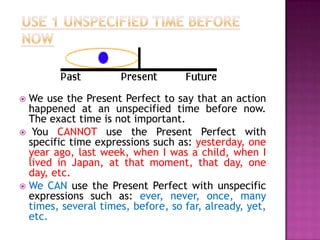Present perfect
- 2. Positive Negative Question I / you / we / t I have hey spoken. I have not spoken. Have I spoken? he / she / it He has not spoken. Has he spoken? He has spoken.
- 3. We use the Present Perfect to say that an action happened at an unspecified time before now. The exact time is not important. ï You CANNOT use the Present Perfect with specific time expressions such as: yesterday, one year ago, last week, when I was a child, when I lived in Japan, at that moment, that day, one day, etc. ï We CAN use the Present Perfect with unspecific expressions such as: ever, never, once, many times, several times, before, so far, already, yet, etc. ï
- 4. Examples: ïķ I have seen that movie twenty times. ïķ I think I have met him once before. ïķ There have been many earthquakes in California. ïķ People have traveled to the Moon. ïķ People have not traveled to Mars. ïķ Have you read the book yet? ïķ Nobody has ever climbed that mountain. ïķ A: Has there ever been a war in the United States? B: Yes, there has been a war in the United States.
- 5. The concept of "unspecified time" can be very confusing to English learners. It is best to associate Present Perfect with the following topics: TOPIC 1 Experience You can use the Present Perfect to describe your experience. It is like saying, "I have the experience of..." You can also use this tense to say that you have never had a certain experience. The Present Perfect is NOT used to describe a specific event.
- 6. Examples: ï I have been to France. THIS SENTENCE MEANS THAT YOU HAVE HAD THE EXPERIENCE OF BEING IN FRANCE. MAYBE YOU HAVE BEEN THERE ONCE, OR SEVERAL TIMES. ï I have been to France three times. YOU CAN ADD THE NUMBER OF TIMES AT THE END OF THE SENTENCE. ï I have never been to France. THIS SENTENCE MEANS THAT YOU HAVE NOT HAD THE EXPERIENCE OF GOING TO FRANCE. ï I think I have seen that movie before. ï He has never traveled by train. ï Joan has studied two foreign languages
- 7. TOPIC 2 Change Over Time We often use the Present Perfect to talk about change that has happened over a period of time. Examples: ï You have grown since the last time I saw you. ï Japanese has become one of the most popular courses at the university since the Asian studies program was established. ï My English has really improved since I moved to Australia.
- 8. TOPIC 3 Accomplishments We often use the Present Perfect to list the accomplishments of individuals and humanity. You cannot mention a specific time. Examples: ï Man has walked on the Moon. ï Our son has learned how to read. ï Doctors have cured many deadly diseases. ï Scientists have split the atom.
- 9. TOPIC 4 An Uncompleted Action You Are Expecting We often use the Present Perfect to say that an action which we expected has not happened. Using the Present Perfect suggests that we are still waiting for the action to happen. Examples: ï James has not finished his homework yet. ï Susan hasn't mastered Japanese, but she can communicate. ï Bill has still not arrived. ï The rain hasn't stopped.
- 10. TOPIC 5 Multiple Actions at Different Times We also use the Present Perfect to talk about several different actions which have occurred in the past at different times. Present Perfect suggests the process is not complete and more actions are possible. Examples: ï The army has attacked that city five times. ïI have had four quizzes and five tests so far this semester. ï We have had many major problems while working on this project.
- 11. ï With Non â Continous Verbs and noncontinuous uses of Mixed Verbs, we use the Present Perfect to show that something started in the past and has continued up until now. "For five minutes," "for two weeks," and "since Tuesday" are all durations which can be used with the Present Perfect.
- 12. ï puts emphasis on the result Example: She has written five letters. ï action that is still going on Example: School has not started yet. ï action that stopped recently Example: She has cooked dinner. ï finished action that has an influence on the present Example: I have lost my key. ï action that has taken place once, never or several times before the moment of speaking Example: I have never been to Australia.












